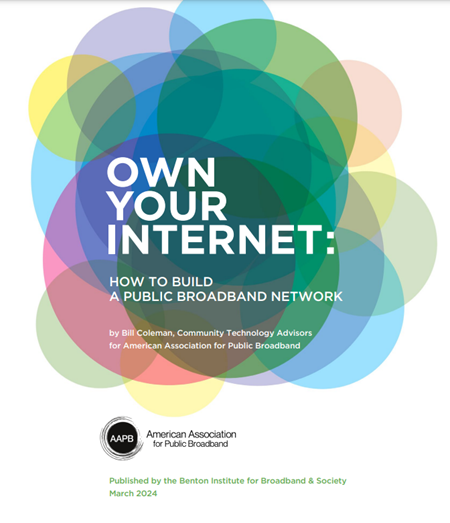
Fast, affordable Internet access for all.

More cities and towns across the U.S. are exploring municipal broadband as an increasingly attractive and effective approach to bring ubiquitous, and affordable, high-speed Internet to its residents and businesses.
Now, a new handbook has been published that is tailored to guide local officials in navigating the logistical, technical, financial, and political challenges along the way.
Hot off the presses this week comes “Own Your Internet: How To Build A Public Broadband Network” – a project of the American Association for Public Broadband (AAPB), published in partnership with the Benton Institute for Broadband & Society.

“This handbook is a key part of AAPB's strategy to double the number of public networks in the next five years, supporting communities in leveraging these networks for economic development, smart city initiatives, and attracting new residents," AAPB Executive Director Gigi Sohn said in announcing the handbook release.
Benton Executive Director Adrianne B. Furniss said the collaboration in publishing the guide made sense because “every community has a stake in this broadband moment—and they must have the tools they need to decide how they will meet their connectivity needs. We trust that this handbook is one of many tools communities will use to assess their situation and plan for a connected future.”
Summit County, Ohio says it’s making progress on a $75 million, 125-mile fiber-optic ring made possible courtesy of American Recovery Plan Act (ARPA) funds. The project will start by providing gigabit connectivity to all county first responders, after which county leaders say they’ll focus on shoring up lagging broadband access to long-neglected communities.
A 2017 report by an outside consultant found that Summit County, like so much of America, struggles with a dearth of affordable broadband access thanks to a heavily monopolized U.S. broadband market. The county’s fixed-line broadband market is dominated by two major incumbents, Centurylink and Comcast, and wireless access remains spotty across large swatches of the county’s more rural territories.
Introduced last year, Summit County Executive Ilene Shapiro noted the network will first connect all 31 city, village and township governments to gigabit speed broadband and a data center. The network is expected to cost as much as $75 million. $35 million of that total will be pulled from the $105 million in ARPA funding received by the county.

Summit County’s interest in more affordable broadband extends back years. County leaders played a key role in beating back monopoly efforts in the state legislature to effectively ban publicly-owned broadband networks. Once those efforts were defeated, county leaders began formulating their broadband expansion plans in earnest.
Summit County has put together a multi-part, $75 million broadband plan to improve connectivity in the area: a middle-mile institutional fiber ring to connect the county’s public safety facilities and expand its broadband capacity, a new datacenter, and a fiber investment to specifically target residents and businesses in the county’s underserved areas and economic activity hubs. When completed, the whole project will go down as one of the county’s largest capital projects to date.
Summit will dedicate $35 million of the $105 million it received from the American Rescue Plan (ARPA) for the fiber ring, another $20 million in ARPA dollars to serve job hubs and areas of need, and $20 million of its own county funding for the datacenter. But the locally driven solution almost didn’t materialize, with recent movement in the state legislature threatening community-owned solutions that remain out of step with both residents and local officials.
Defending Community Broadband Against State Challenges
The county’s potential for better connectivity was threatened last year, when the state of Ohio introduced some last-minute legislation that threatened to outlaw public broadband. In June of 2021, an amendment banning municipally-owned broadband was anonymously tacked onto the State Senate budget bill. The amendment barred the creation of new municipal networks and the ongoing operation of existing municipal networks in areas where a private provider offered service. It prevented city governments from accepting federal money for broadband projects, and allowed city-owned networks to provide service only in areas where no private provider was present (less than two percent of Ohio).
Welcome to In Our View. From time to time, we use this space to explore new ideas and share our thoughts on recent events playing out across the digital landscape, as well as take the opportunity to draw attention to important but neglected broadband-related issues.
As federal funds to expand high-speed Internet access began to flow to states and local communities through the American Rescue Plan Act, and with billions more coming under the Infrastructure Investment and Jobs Act, Big Telecom is beginning to mount its expected opposition campaign designed to discourage federal (and state) decision-makers from prioritizing the building of publicly-owned networks.
Predictably, a centerpiece of this anti-municipal broadband campaign is the trotting out of well-worn - and thoroughly debunked - talking points, arguing that federal funding rules should not “encourage states to favor entities like non-profits and municipalities when choosing grant winners” because of their “well-documented propensity to fail at building and maintaining complex networks over time.” That’s what USTelecom, a trade organization representing big private Internet Service Providers (including the monopolies) wrote in a memo sent last week to President Biden, the FCC, cabinet secretaries, House and Senate members, Tribal leaders, as well as state broadband offices.